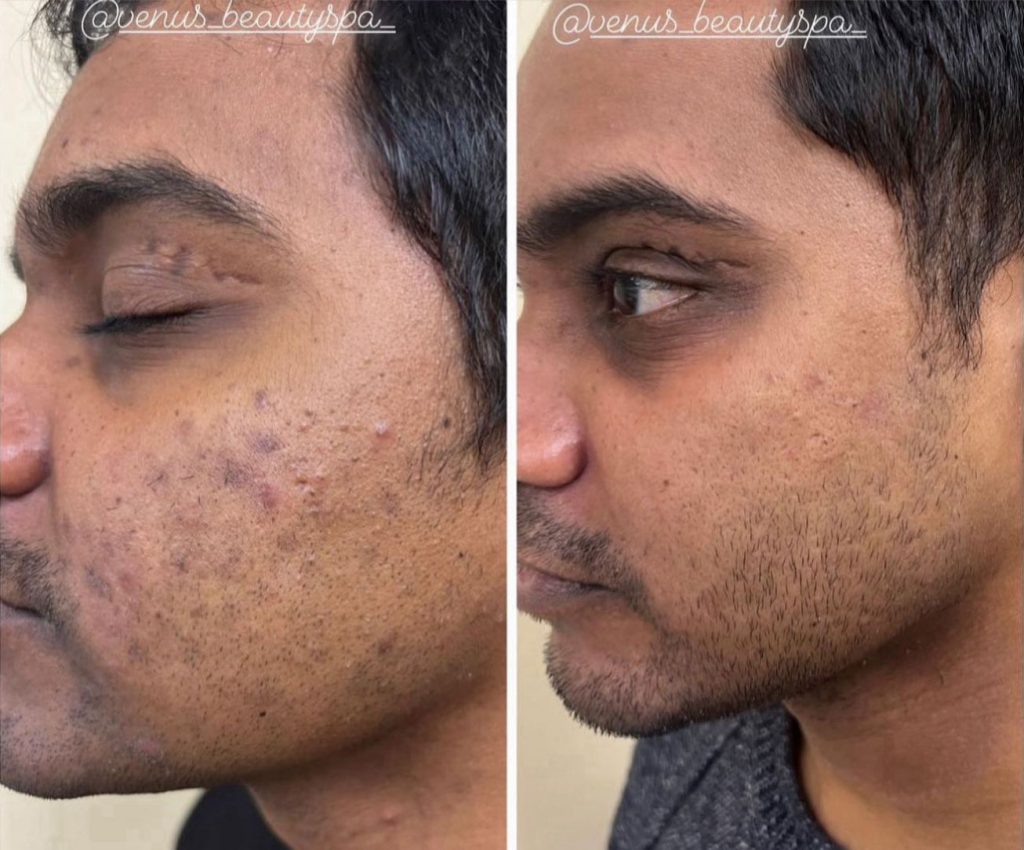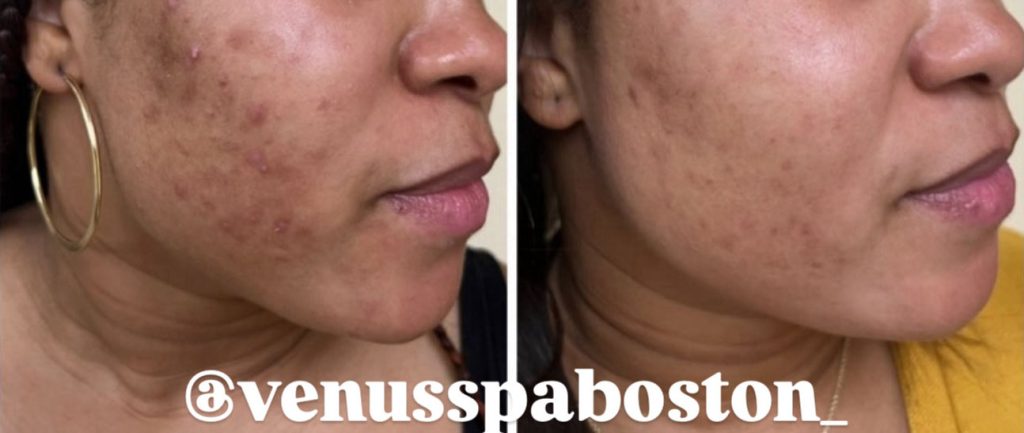A chemical peel is a skin-resurfacing treatment that uses acids to exfoliate the top layers of your skin. Some work gently on the surface, while others go deeper to target more stubborn concerns. They help clear a host of skin issues, including dullness, acne, melasma, dark spots, fine lines, rough texture, or sun damage.
A professional peel treatment at Venus Spa can give you smoother skin, a brighter tone, fewer breakouts, and a serious glow that makes you want to skip the makeup. If you’re in or near East Boston, MA, our team is ready to help you achieve the glow your skin deserves. BOOK YOUR APPOINTMENT TODAY.
What Is a Chemical Peel?
A chemical peel is a cosmetic treatment that removes dead skin cells using a chemical solution. It works by exfoliating the top layer of skin to reveal newer, healthier skin underneath. Depending on the strength of the peel, it can treat surface-level concerns or penetrate deeper layers for more dramatic results. Peels are typically categorized as light, medium, or deep.
Light Peels
Light peels, aka gentle peels, use gentle acids like alpha hydroxy acids (AHAs) or salicylic acid to exfoliate the outermost layer of skin. This peel is ideal for mild acne, dullness, rough texture, and early signs of aging with no downtime required.
Medium Peels
These go deeper into the middle layers of skin using acids like trichloroacetic acid (TCA). They target sun damage, hyperpigmentation, fine lines, and moderate acne scarring. If you’re getting this peel, expect a few days of redness, flaking, and peeling.
Deep Peels
These use stronger solutions, like high-strength TCA or phenol, to reach the lower dermal layers. They’re used for deeper wrinkles, severe sun damage, and long-standing pigmentation. Downtime can last 1–2 weeks, but the results are dramatic and long-lasting.
What Are the Benefits of Chemical Peels?
Chemical peels are clinically proven to improve a plethora of skin issues, and they’re highly sought after for these benefits:
- Brighter, more even skin tone
- Smoother texture you can feel
- Fewer breakouts and less congestion
- Smaller-looking pores
- Softens fine lines and wrinkles
- Fades dark spots and sun damage
- Boosts collagen for firmer-looking skin
- Helps makeup apply more evenly
- Gives you that “I woke up like this” glow
Are Chemical Peels Safe?
Chemical peels are safe and effective for most skin types when done by a trained professional. But not every peel is right for every concern. Acne-prone skin often does well with salicylic acid peels that help unclog pores and reduce breakouts.
If you’re targeting dark spots or melasma, glycolic or TCA peels can help fade discoloration. But if you have a deeper skin tone, you’ll need a gentler approach to avoid triggering hyperpigmentation. For aging skin, medium-depth peels can soften fine lines and improve firmness. And if your main concern is dullness or texture, light peels are a safe way to refresh without downtime.
That said, not everyone is a candidate. You’ll want to avoid peels if you have active eczema, psoriasis, open wounds, or if you’re using medications like Accutane. Those with a history of keloids or pigmentation issues should also stick to lighter options unless directed otherwise. And if you’re pregnant or breastfeeding, certain acids are off-limits.
Do Chemical Peels Help With Acne?
They do, and we’ve seen it firsthand. Many of our patients dealing with acne have seen major improvements after a series of chemical peels. Peels help by clearing out clogged pores, reducing oil, and calming inflammation. These are the three big factors in breakouts.
Salicylic acid peels, in particular, work deep in the pores and are especially helpful for blackheads, whiteheads, and hormonal acne. If acne scars or dark spots are a concern, medium-depth peels like glycolic or TCA can help fade discoloration and smooth rough texture over time.
We’ve had patients come in with years of stubborn acne and leave with clearer, more confident skin after just a few sessions. If you’re in or near East Boston, Revere, or Winthrop, Venus Spa offers custom peels for every skin concern. Book your glow today.


How Long Does a Chemical Peel Take?
Most chemical peels take about 30 to 45 minutes from start to finish. Light peels are quick. You’ll be in and out in under an hour. Medium peels may take a bit longer, especially if your provider is prepping the skin or applying multiple layers. Deep peels are more intensive and may require a longer appointment and post-treatment monitoring.
The actual peel application only takes a few minutes. Most of your time will be spent cleansing the skin, prepping, and walking through aftercare. You can go right back to your day after a light peel. Medium and deep peels may require some downtime, so plan accordingly.
How Much Is a Chemical Peel?
The cost of a chemical peel treatment varies based on the depth of the peel and your provider. Pricing also depends on location, the type of acid used, and whether post-care products are included. Light peels are the most affordable and great for regular maintenance. Medium and deep peels come with a higher price tag but offer more dramatic, long-term results.
What If I’m Not Sure Which Peel Is Right for Me?
If you’re not sure which peel is right for you, don’t worry. That’s our job. Chemical peels are meant to be tailored. At Venus Spa, we build every treatment around your skin’s needs, whether you’re tackling breakouts, sun spots, or fine lines.
With expert care and a focus on your long-term glow, we’ll guide you to the right peel. Schedule a consultation at Venus Spa today! We serve clients in and around East Boston, MA, including Winthrop, Revere, Chelsea, Everett, and surrounding neighborhoods in Greater Boston.
Frequently Asked Questions
Do chemical peels hurt?
Light peels may just tingle or feel warm. Medium and deep peels can sting or burn for a few minutes while the solution is on your skin. It’s uncomfortable but temporary, and we do provide you with post-peel soothing products to ease discomfort.
How long does a chemical peel take to heal?
Light peels heal in about 1 to 3 days with mild flaking. Medium peels take closer to 5 to 7 days, with noticeable redness and peeling. Deep peels require 10 to 14 days of real downtime, and redness can last even longer.
How often should I get a chemical peel?
Most people get a chemical peel every 6-8 weeks. Light peels can be done more often, while medium and deep peels need more time between treatments. Your provider will recommend a schedule based on your skin type and goals.
Where to get a chemical peel?
Always go to a licensed provider with experience in skin resurfacing. At Venus Spa, we offer personalized chemical peels based on your skin goals and history. You’ll be in the hands of professionals who prioritize safety, results, and expert care.
Client Testimonials
I had a hydrafacial with Diana, she was extremely knowledgeable and informative. My experience was super relaxing and I enjoyed it. The spa is very clean , smells amazing, and is welcoming. They have an array of services to choose from to suit your skin needs. 10/10 Weould recommend booking with Diana!
Alyssa N.
I came into town for work and had some time to kill and booked a facial. I can not say enough about the customer experience, I learned so much great information and truly enjoyed my facial. I will be booking every time I’m in Boston!
Ashley B.
Absolutely 💯 I’d recommend Letizia (Venus Spa). She’s super nice, and knowledgeable. I’ve been going to her a few years now and I’m never disappointed with my results with lightening peels. Today is my first time trying microneedling with exosomes and I can’t wait to see the results.
As a woman of colour, it was so hard around where I live to find someone to care for my skin until I found Letizia. Results are amazing 👏
Love you girl 😃Bebe A.



